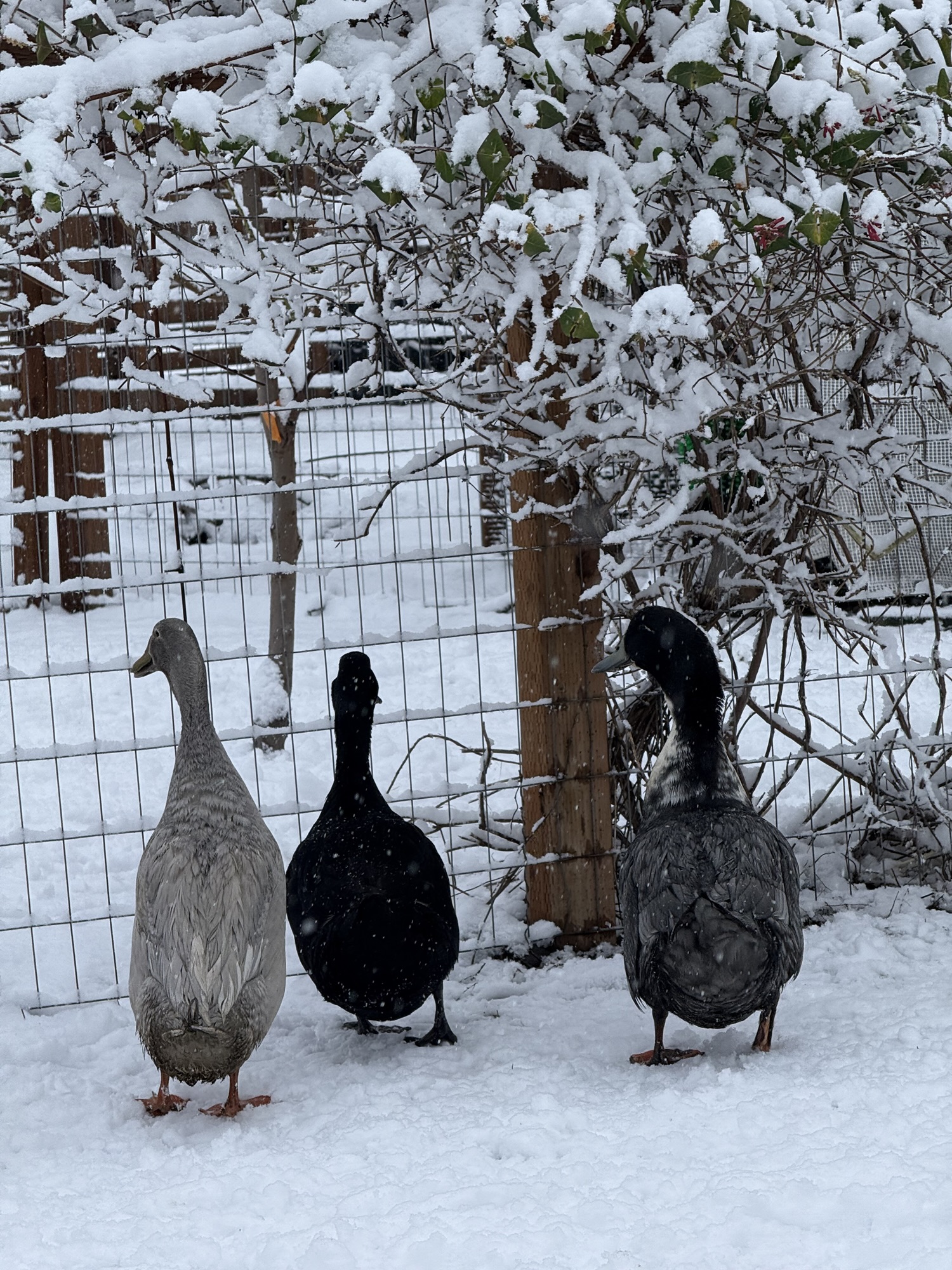When looking into getting ducks, I thought they always needed access to a pond. What I learned was simply that they don’t. I also learned that they are super resilient and are better at keeping themselves warm than chickens. Here is what they do need in the winter.
Winter Dietary Care
Our ducks are free-range in our half-acre lot all day, every day. The only time they are locked in their enclosure is twice a year when we fertilize our lawn. Otherwise, they can roam to their heart’s content. They get to eat all the grubs and bugs, helping us keep our yard pest-free. Free-ranging can get tricky in the winter with the snow on the ground. Surprisingly, our ducks love the snow. Even with two feet of snow, I will find them in our yard, waddling around in the snow. Gerty, our goose, follows, as always.

But, with the lack of grass and bugs in the winter, ducks still need something to fill their bodies with. We always provide supplemental pellets for our ducks. Even in the summer, although they are amazing foragers, they still like returning to their enclosure and getting a bite of pellets. For water, because ducks always need access to deep enough water to stick their entire face into, we use a shallow grain bin for larger livestock. Jordan cut out a top to attach so they wouldn’t get in and swim around, making the water dirty. Their water also has a stock tank heater in it to ensure no ice-free water.

Winter Enclosure Care
Easy Clean Duck Coop
Our Easy Clean Duck Coop keeps the ducks and our goose warm at night by providing them with space to lay down in protection and enough airflow so they don’t freeze or the coop grows mold. Ducks are wet, damp animals, even in the winter. If your duck coop lacks airflow, your ducks risk freezing because the water cannot evaporate and stays stagnant. This coop is built to last. It has had at least two feet of snow on its roof with no problems.

Bedding for Winter
We use our pine pellets over the winter months, as they make the coop easy to clean. When the pellets have absorbed all they can, we throw another layer on until we can get a wheelbarrow pushed into the enclosure to shovel everything out of the coop. It’s important that the bedding stays relatively dry.
Enclosure Walkway Care
Since we now have a use for straw and a place to store it, I will add straw to their walkways to provide them with a little more comfort in the snow. Before this year, I did not do this. It’s just an extra little thing you can do for your ducks (and chickens). But they don’t need it. On particularly snowy days, we keep their coop open so they can have shelter. They usually choose to stay outside, lay down on the snow, and after a little bit, they are covered in snow. It’s pretty cute. It also shows how resilient they are in different types of weather. Ducks are more resilient than chickens across the board regarding weather.
Supplemental Heat
We don’t add any supplemental heat to our chicken or duck coop. Adding supplemental heat also increases the risk of fire. This is because when their coop is built well, with great ventilation, their bodies and natural heat will keep them warm. Ducks are more resilient in winter because of their double layer of waterproof feathers, down feathers underneath those, and a layer of fat that keeps them extra toasty warm. Chickens have wattles and combs that can easily get frostbite. Ducks are only susceptible to frostbite when there is insufficient ventilation and their moisture gets trapped.
Ducks Habits in Winter
Ducks do well in winter and are more active than our chickens. They like to get out and about, explore, visit the other animals (especially the rabbits), and hang out. Ducks love to be outside, even in the snow. Our ducks can be in their coop, but they choose to tuck their beaks in, lay down, and get comfortable in the snow. They are perfectly content this way. They are enjoyable to watch waddle through the snow. They provide entertainment year-round. That’s one of the reasons why ducks are becoming increasingly popular among backyard farmers and homesteaders.

Duck Baths in Winter
Now that I know ducks don’t need water to bathe in, I have learned that they still bathe in the winter. They use the snow! Like how they bathe in the spring, summer, or fall in their pond, they use the snow to clean themselves. They also continue to use their beaks to clean their feathers. But they dive their heads into the snow like they dive their heads into the water.

Ducks Laying Habits in Winter
Our ducks only lay seasonally, from early spring until the end of summer. Just like chickens, ducks need supplemental light to continue laying. We don’t add light to our duck coop as they aren’t in there enough to make a difference. It can be very beneficial to give your ducks this break in laying. If your ducks are your main source of eggs, you could consider adding supplemental light to continue getting their delicious eggs.

Overall, ducks are more resilient in most weather conditions. With the little extra habits you can put in place for them to be even more comfortable, your ducks will continue to thrive in even the coldest temperatures.
More LoDown in these posts:
How to Care for Babydoll Sheep in Winter

